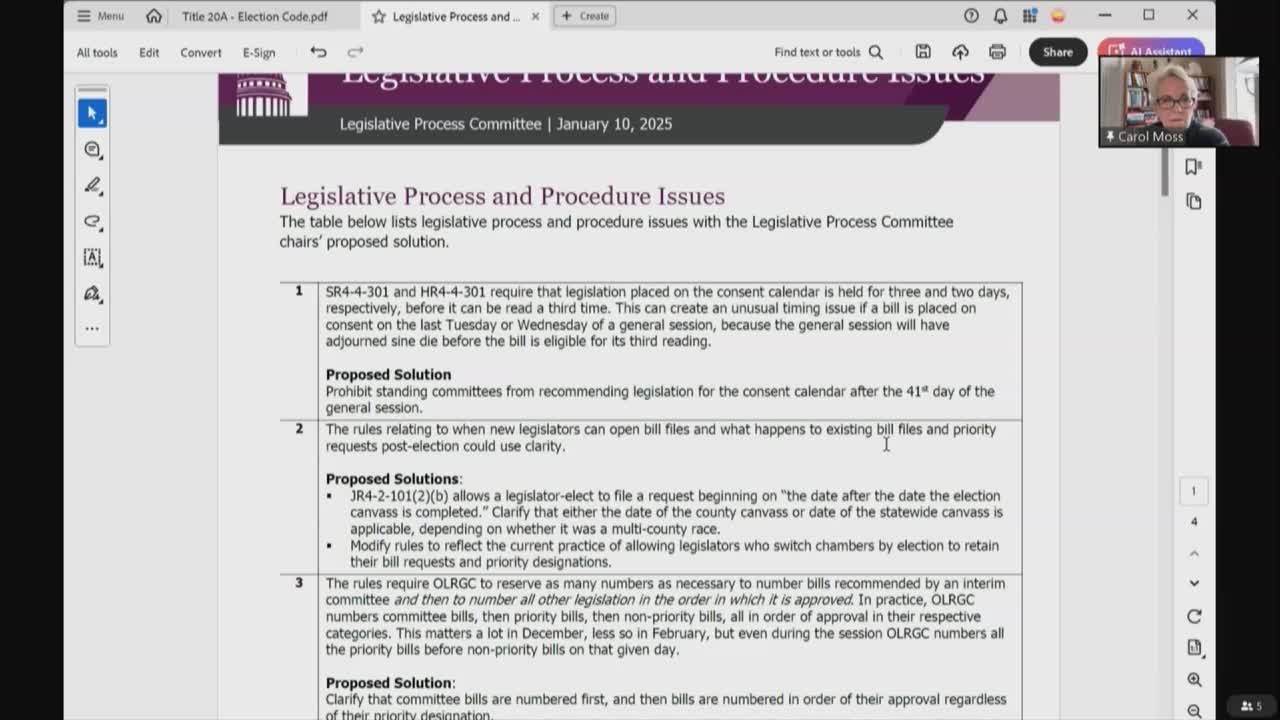Committee reviews 15 procedural issues and votes to open three bill files to implement changes

Summary
After a staff-led review of about 15 procedural and technical issues affecting session operations, the Legislative Process Committee voted to open three bill files — a house resolution, a senate resolution and a joint resolution — to draft the proposed rule changes.
The Legislative Process Committee reviewed a list of procedural and technical issues collected by staff and the chairs and voted to open three bill files to draft rule language implementing the proposed fixes.
Megan Bolen of the Office of Legislative Research and General Counsel walked members through the list of approximately 15 items, saying staff collect issues that arise during session and the interim “where rules are applied inconsistently or maybe the rules aren't as clear.” The items included: a cutoff for placing bills on the consent calendar after the 41st day of general session; clarifications on how bill files and priority requests transfer when legislators change chambers or resign; a change to numbering practice so committee bills are numbered first then bills are numbered in order of approval regardless of priority; technical-correction workflow changes tied to the drafting system; adding a definition of censure to House rules to match the Senate; a proposed limit of one post-numbering sponsorship change per bill; clarification that a unanimous interim committee recommendation allows a bill to skip only the standing committee hearing in its chamber of origin; allowing the chair discretion on roll-call votes for electronic meetings; a tie-breaking rule for conflicting bills whereby the last enacted bill (most recent legislative action) would control for conflict resolution; clarifying repeal effect for future-effective-date sections; making sharing of request-for-legislation files with caucus staff more efficient (house only); removing a duplicative rule requiring rules committees to meet before session; clarifying that sponsor changes or substantive edits to committee bills should not be allowed before a committee bill is numbered; deadlines and timing changes for appropriations and fiscal-note bills; reassigning oversight subcommittee responsibilities after that subcommittee’s proposed elimination; and authorizing Legislative Process Committee chairs to open committee bill files subject to interim-committee rules.
Representative Jared Dunnigan said the items are the product of chairs and staff reviewing issues over the interim. Members asked clarifying questions on several items: Representative Perucci pressed on consent-calendar timing at the end of session; staff clarified how the 41st-day cutoff would operate to prevent bills placed on consent too late to receive the required hold period; members asked whether sponsor-transfer limits apply per bill or per legislator and staff said the chairs had discussed a per-legislator approach but the draft language in discussion was per bill.
After the briefing the committee voted on a motion to open three bill files — described on the record as a house resolution, a senate resolution and a joint resolution — to draft language addressing these items. Representative Wilcox moved to open the files; the motion passed by voice vote.
Bolen told the committee staff would prepare the draft bill files and return language to the committee for further review. The committee also discussed follow-up timing and an interim meeting later in the year to review drafts.
Ending: Committee members agreed to send staff forward to draft the proposed rule language in three bill files for future committee consideration and returned several complex items for additional study.

